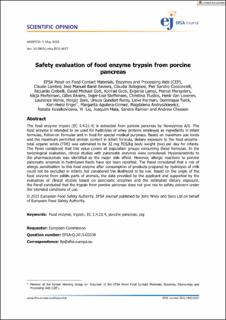Safety evaluation of food enzyme trypsin from porcine pancreas
Lambré, Claude; Barat Baviera, José Manuel; Bolognesi, Claudia; Cocconcelli, Pier Sandro; Crebelli, Riccardo; Gott, David Michael; Grob, Konrad; Lampi, Evgenia; Mengelers, Marcel; Mortensen, Alicja; Rivière, Gilles; Steffensen, Inger-Lise; Tlustos, Christina; Van Loveren, Henk; Vernis, Laurence; Zorn, Holger; Ursula, Gundert-Remy; Herman, Lieve; Turck, Dominique; Engel, Karl-Heinz; Aguilera-Gómez, Margarita; Andryszkiewicz, Magdalena; Kovalkovičová, Natália; Liu, Yi; Maia, Joaquim; Rainieri, Sandra; Chesson, Andrew
Research report
Published version

Permanent lenke
https://hdl.handle.net/11250/2988457Utgivelsesdato
2021Metadata
Vis full innførselSamlinger
Sammendrag
The food enzyme trypsin (EC 3.4.21.4) is extracted from porcine pancreas by Novozymes A/S. Thefood enzyme is intended to be used for hydrolysis of whey proteins employed as ingredients in infantformulae, follow-on formulae and in food for special medical purposes. Based on maximum use levelsand the maximum permitted protein content in infant formula, dietary exposure to the food enzyme–total organic solids (TOS) was estimated to be 32 mg TOS/kg body weight (bw) per day for infants.The Panel considered that this value covers all population groups consuming these formulae. In thetoxicological evaluation, clinical studies with pancreatic enzymes were considered. Hypersensitivity tothe pharmaceuticals was identified as the major side effect. However, allergic reactions to porcinepancreatic enzymes in hydrolysed foods have not been reported. The Panel considered that a risk ofallergic sensitisation to this food enzyme after consumption of products prepared by hydrolysis of milkcould not be excluded in infants but considered the likelihood to be low. Based on the origin of thefood enzyme from edible parts of animals, the data provided by the applicant and supported by theevaluation of clinical studies based on pancreatic enzymes and the estimated dietary exposure,the Panel concluded that the trypsin from porcine pancreas does not give rise to safety concern underthe intended conditions of use.